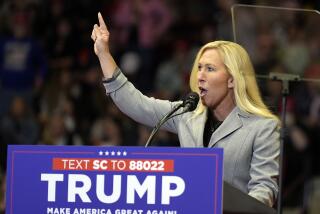No good reform deed will go unpunished
It finally dawned on me why Gov. Jerry Brown hasn’t been able to cut a tax deal with Republicans. It’s because Democratic legislative leaders no longer are allowed to draw legislative and congressional districts.
Blame reform and its unintended consequence.
If the governor’s allies still could custom-craft districts to legislators’ liking — or to ensure their political demise — they’d be able to make offers that Republicans couldn’t refuse.
Yes, I’m being a tad facetious. But not entirely.
It shouldn’t shock anyone — even idealists and ignoramuses — that political calculations are part of politics. And politics is democracy. And that’s the way it works.
This is the way it might have worked if voters had not stripped legislators of their traditional power to draw legislative and congressional districts:
A backbench Republican is summoned to an isolated, windowless room in the Capitol. There are two large maps on a table. “Here are two districts,” he’s told by a Democrat Tom Hagen type. “Which one do you want?
“Run in one and you survive. Run in the other, you sleep with the fishes.”
“I’ll take the first,” the GOP lawmaker replies. “And, of course, I strongly support the governor’s tax plan.”
That’s fiction based on historic fact. Many favors have been granted and much family business settled during redistricting. Allies gets comfy districts; adversaries get to retire.
But voters in 2008 created an independent commission to handle the once-a-decade chore of redistricting, as it should. We couldn’t continue to allow legislators to blatantly gerrymander, choosing their own voters.
The commission is zipping around the state, conducting community meetings and listening to local citizens’ ideas about redistricting. The panel isn’t allowed to consider the party registrations of voters, let alone to purposely draw a district in favor of a Democrat or Republican.
The initial drafts of district maps are due by June 10. Final maps must be adopted by Aug. 15. Legislators will run in the districts next year, assuming the boundaries are not rejected by the state Supreme Court when some disgruntled politicians or interest groups inevitably sue.
This is a reform long overdue. But few things in politics are all black or white.
Reform isn’t all good. The century-old citizens’ initiative has led to ballot-box budgeting, a major contributor to deficit spending. Term limits weakened the Legislature’s ability to respond to California’s needs. And — although on a lesser scale — independent redistricting is undermining legislative leadership.
“At the end of the day, this is all about political survival for Republicans and Democrats,” says political consultant Steve Maviglio, who was a communications strategist for former Assembly Speaker Fabian Nuñez and ex-Gov. Gray Davis. “If you’re a little more secure about where you’re going to run, it makes a difference. That’s politics.”
Democrat Maviglio has had first-hand experience. He was a three-term legislator in New Hampshire before leaders “got rid of my district,” he recalls. He’d been in their faces many times with environmental bills “that they frowned upon. They threw me into a district with a couple of Republicans. It was a great maneuver. I decided not to run again.”
Despite being whacked by a gerrymander, Maviglio has opposed redistricting “reform” from the get-go.
But lobbyist Robert Naylor, a reform supporter and one-time Assembly GOP leader who three decades ago battled then-Gov. Brown and Democrats over gerrymandering, acknowledges that “redistricting clearly is a leadership tool.”
“I’ve heard that,” says commission member Maria Blanco of Los Angeles, a Democrat and civic activist. She’s heard that the majority party has lost political strength because it can’t control redistricting. But the price for that strength, she continues, is unfair gerrymandering and it is “not worth the tradeoff.”
“Maybe it makes things work in Sacramento. But it doesn’t necessarily work for people outside of Sacramento.”
The combination of two voter-approved reforms — independent redistricting and an open primary system — is having a chilling effect on budget/tax negotiations, many believe. Republicans particularly are frozen.
Under the new open primary system next year, there no longer will be party nominations. There will be only one ballot, open to all candidates and voters. The top two vote-getters, regardless of party, will advance to the general election.
“Everything legislators think they know about running for office is getting tossed out the window,” says former Republican legislative leader Jim Brulte of Rancho Cucamonga, now a government relations strategist.
Brulte is widely respected as the wise Republican graybeard of California, although he’s only 55 and he’s beardless.
“On paper,” he says, “we should see the election of more moderate Republicans and more moderate Democrats. That’s the way it works on paper. That said, until we go through two or three of these elections, you really don’t know whether it works in real life.
“But I’m inclined to believe we get more moderates in both political parties.”
That’s unsettling to many lawmakers, especially conservatives. Liberals already have bent their ideologies and angered constituents by taking a machete to spending, cutting deeper even than Republicans dared. Now they’re searching for a few GOP tax votes to close a remaining $15-billion deficit.
“There are concerns about the unknown,” says Senate leader Darrell Steinberg (D-Sacramento). “Conversations about redistricting and the open primary come up often. Everyone recognizes that significant change is around the corner.”
What’s missing is the ability to dangle a desirable or deadly district: Choose one. That’s political leadership.
But Blanco is right. It’s not worth the tradeoff.
Brown can get his taxes some other way, and he will.
More to Read
Start your day right
Sign up for Essential California for news, features and recommendations from the L.A. Times and beyond in your inbox six days a week.
You may occasionally receive promotional content from the Los Angeles Times.







